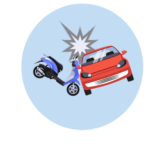Vehicle Insurance
Key Features








What is Vehicle Insurance ?
Vehicle insurance, also known as car insurance, motor insurance, or auto insurance, which is a type of insurance that covers cars, trucks, motorcycles, and other road vehicles. The primary function of it is to offer financial protection against physical damages or bodily injury caused by traffic collisions, as well as liability that could also come from accidents in a vehicle. Vehicle insurance can provide financial protection against vehicle theft and damage caused by events other than traffic collisions, damage sustained by colliding with stationary objects, such as keying, weather, or natural disasters. The legal regulations in each region determine the specific terms of vehicle insurance.
Types of Motor Insurance
Insurance policy for Private Cars
The Government of India mandates the taking of motor insurance for any private car owned by an individual. This policy covers damage to the vehicle caused by accidents, fire, natural disasters, theft, and any injuries sustained by the owner. Any damages and injuries caused to the third party are covered by it as well.
Insurance policy for Two-Wheeler
Two-wheelers like a scooter or bike are covered by this insurance policy, which is mandated by The Government of India. The insurance policy covers the two-wheeler against damages due to accidents, disasters, fire, theft, etc., and also against damages and injuries to third parties. Personal accident coverage is mandatory for the owner rider and passengers can also take it.
Insurance policy for Commercial Vehicle
Vehicles that are not used for personal purposes are covered by this insurance. This insurance covers vehicles such as trucks, buses, heavy commercial vehicles, light commercial vehicles, multi-utility vehicles, agricultural vehicles, taxi/cab, ambulances, auto-rickshaws, etc.
Types of Vehicle Insurance Policies
Different types of losses can be covered by different policies. For example, a specific vehicle insurance policy may cover accidental damage, but not theft. The policies for car insurance and bike insurance may different in some way. Vehicle insurance policies can be divided into different categories:
Third-Party Insurance
Any damages or losses suffered by the third party during an accident must be compensated by the third party insurance holder. This does not cover accidental injuries/damages caused by the owner/driver’s fault or theft. The premium of a third-party vehicle insurance policy is typically lower than that of other policies.
Own Damage Insurance
The loss of a vehicle or its parts can occur due to theft, natural causes such as fire, weather conditions, etc. Man-made problems, such as vandalism, riots, and the like, can also cause it to happen. Own damage policy covers the cost of repairing and replacing these damages, as well as the cost of repairing or replacing belongings in case of accidents.
Comprehensive Insurance
Financial coverage for both third-party liabilities and own damage is included in this policy. The is a comprehensive policy and provides in-depth protection against various types of damages, including end-to-end coverage. Additionally, it has a deductible and a higher premium.
Collision Insurance
The damage caused by collisions with stationary objects or other vehicles on the road is covered under this type of motor insurance policy. It covers damage caused by potholes or vehicle rolling. There is no coverage for car breakdowns or damage caused by wear and tear. These costs are usually covered by the own damage policy.
Additional Policies
There are additional motor insurance policies that can be added as add-ons to the main types of covers discussed above. Damage to the glass of rear/side windows and sunroofs is covered by Glass Insurance (under car insurance). Engine Protection Cover provides insurance for the costs of repairing the engine after water intrusion or oil/lubricant leakage. Consumable Cover provides insurance coverage for consumable items such as washers, AC gas, bearings, engine oil, fuel filter, etc. The depreciation cost (the difference between the actual cost and the current market value.) of the vehicle at the time of the claim is covered by Gap Insurance Policies or Depreciation Covers.
Benefits of Vehicle Insurance
- Financial Protection: Protects you from the potentially high costs of vehicle repairs, medical bills, theft or robbery of the vehicle or its belongings and legal fees.
- Legal Requirement: In most places, having at least basic liability insurance is mandatory.
- Peace of Mind: Knowing you have coverage can reduce stress and anxiety while driving.
Additional Options:
- Gap Insurance: Covers the difference between the actual cash value of a leased or financed car and the amount still owed on the loan or lease.
- Roadside Assistance: Provides help for breakdowns, flat tires, lockouts, and other roadside emergencies.
- Rental Reimbursement: Pays for a rental car while your vehicle is being repaired after a covered accident.
Vehicle insurance policies vary widely in terms of coverage options, limits, and costs. It’s important to review and understand your policy to ensure you have the right protection for your needs.
Vehicle Insurance is Mandatory
According to the Motor Vehicles Act, 1988, every vehicle owner must have at least a third-party insurance policy. This policy covers any legal liability arising out of injuries or damages caused to a third party (including property) in the event of an accident.
There are two main types of car insurance policies available in India:
- Third-Party Insurance: This is the minimum legal requirement. It covers damages to third-party property or injuries to other people but does not cover any damages to the insured vehicle or the driver.
- Comprehensive Insurance: This policy covers third-party liabilities as well as damages to the insured vehicle and injuries to the driver. It also includes coverage for theft, natural disasters, and other non-collision-related damages.
Having at least third-party insurance is essential to avoid legal penalties and ensure financial protection against potential liabilities.
Reasons for Vehicle Insurance is Mandatory
Vehicle insurance is mandatory for several reasons, which primarily revolve around protecting individuals and society as a whole. Here are some key reasons:
- Financial Protection: Insurance provides financial coverage in case of accidents, theft, or damage to your vehicle. This helps vehicle owners avoid substantial out-of-pocket expenses that could otherwise be financially devastating.
- Legal Requirement: In many countries, having vehicle insurance is a legal requirement. This ensures that if you’re involved in an accident, you can compensate others for damages or injuries caused. It also helps maintain order and responsibility on the roads.
- Social Responsibility: Insurance promotes social responsibility by ensuring that drivers take financial responsibility for their actions on the road. This reduces the burden on public services and taxpayers in case of accidents.
- Risk Management: Insurance companies assess risks associated with driving and set premiums accordingly. This encourages safer driving behaviour and helps mitigate risks for both drivers and insurers.
- Protection for Others: Vehicle insurance not only protects the owner but also provides coverage for third parties who may be affected by accidents caused by the insured vehicle. This includes compensation for injuries or damages to other vehicles or property.
- Peace of Mind: Knowing that you are financially protected in case of unexpected events can provide peace of mind to vehicle owners and their families.
